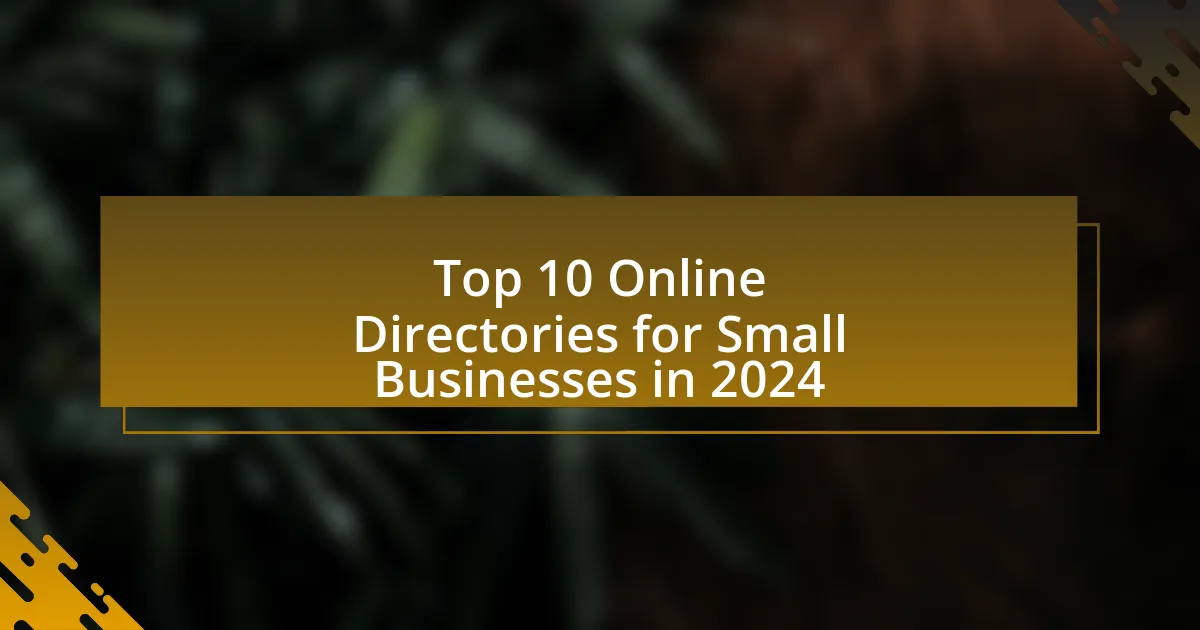The article focuses on the top 10 online directories for small businesses in 2024, highlighting platforms such as Google My Business, Yelp, Facebook Business, and Yellow Pages. It discusses the benefits of these directories, including increased visibility, customer engagement, and improved local SEO. Key features that make an online directory effective are outlined, along with strategies for small businesses to leverage these platforms for growth. The article also emphasizes the importance of accurate business information, user reviews, and SEO in maximizing directory presence and enhancing credibility.

What are the Top 10 Online Directories for Small Businesses in 2024?
The top 10 online directories for small businesses in 2024 are Google My Business, Yelp, Facebook Business, Bing Places, Yellow Pages, TripAdvisor, Angie’s List, Foursquare, Manta, and Thumbtack. These platforms provide essential visibility and marketing opportunities for small businesses, allowing them to connect with potential customers effectively. Google My Business leads the list due to its integration with Google Search and Maps, making it crucial for local SEO. Yelp is known for its user-generated reviews, which significantly influence consumer decisions. Facebook Business offers extensive reach through social media engagement. Bing Places, while less popular than Google, still captures a significant audience. Yellow Pages remains a trusted resource for local searches. TripAdvisor is vital for businesses in the hospitality sector. Angie’s List focuses on service-oriented businesses, while Foursquare provides location-based marketing. Manta and Thumbtack cater to niche markets, helping small businesses find specific customer bases.
How do online directories benefit small businesses?
Online directories benefit small businesses by increasing their visibility and accessibility to potential customers. These platforms aggregate business information, making it easier for consumers to find local services. According to a survey by BrightLocal, 93% of consumers use online directories to find local businesses, highlighting their importance in driving foot traffic and online engagement. Additionally, being listed in reputable directories can enhance a small business’s credibility and improve search engine rankings, as search engines often prioritize directory listings in local search results.
What features make an online directory effective for small businesses?
An effective online directory for small businesses includes features such as user-friendly navigation, comprehensive business listings, search engine optimization (SEO), mobile compatibility, and customer review systems. User-friendly navigation ensures that potential customers can easily find businesses, while comprehensive listings provide essential information like contact details, hours of operation, and services offered. SEO enhances visibility in search results, increasing the likelihood of attracting new customers. Mobile compatibility allows users to access the directory on various devices, catering to the growing number of mobile users. Customer review systems build trust and credibility, as 84% of people trust online reviews as much as personal recommendations, according to a survey by BrightLocal. These features collectively contribute to the effectiveness of an online directory for small businesses.
How can small businesses leverage online directories for growth?
Small businesses can leverage online directories for growth by enhancing their visibility and attracting new customers. By listing their business on popular online directories such as Google My Business, Yelp, and Yellow Pages, small businesses can improve their search engine rankings and reach a wider audience. According to a 2022 survey by BrightLocal, 93% of consumers use online directories to find local businesses, highlighting the importance of being listed. Additionally, these directories often provide customer reviews, which can build trust and credibility, further driving customer engagement and sales.
What criteria should be considered when choosing an online directory?
When choosing an online directory, consider the directory’s relevance to your industry, user traffic, and search engine optimization (SEO) capabilities. Relevance ensures that your business is listed among potential customers, while high user traffic indicates a larger audience for your services. SEO capabilities are crucial as directories that rank well in search engines can enhance your visibility. According to a 2022 study by BrightLocal, 93% of consumers use online directories to find local businesses, highlighting the importance of selecting a directory that effectively connects you with your target audience.
How do user reviews impact the effectiveness of an online directory?
User reviews significantly enhance the effectiveness of an online directory by increasing trust and credibility among potential users. When directories feature authentic user reviews, they provide social proof that influences decision-making, as 79% of consumers trust online reviews as much as personal recommendations. This trust leads to higher engagement rates, as directories with positive reviews attract more visitors and encourage them to utilize the services listed. Furthermore, user reviews contribute to improved search engine rankings, as platforms like Google prioritize user-generated content, making directories more visible to potential customers. Thus, the presence of user reviews directly correlates with increased user trust, engagement, and visibility, all of which are critical for the success of online directories.
What role does SEO play in selecting an online directory?
SEO plays a crucial role in selecting an online directory by influencing visibility and search engine rankings. A directory with strong SEO practices can enhance a business’s online presence, making it easier for potential customers to find them through search engines. For instance, directories that are optimized for relevant keywords and have high domain authority can significantly improve a business’s chances of appearing in search results. According to a study by Moz, 70% of online experiences begin with a search engine, highlighting the importance of SEO in directory selection for maximizing reach and engagement.

Which online directories are most popular among small businesses in 2024?
The most popular online directories among small businesses in 2024 include Google My Business, Yelp, Facebook Business, Yellow Pages, and Bing Places. Google My Business remains the leading platform due to its integration with Google Search and Maps, allowing businesses to enhance their visibility and attract local customers. Yelp is favored for its user-generated reviews, which significantly influence consumer decisions. Facebook Business provides a robust platform for engagement and advertising, while Yellow Pages and Bing Places continue to serve as reliable resources for local searches. These directories collectively support small businesses in reaching their target audiences effectively.
What are the top five online directories for small businesses?
The top five online directories for small businesses are Google My Business, Yelp, Bing Places for Business, Facebook Business, and Yellow Pages. Google My Business is essential for local SEO, allowing businesses to manage their online presence across Google, including Search and Maps. Yelp is widely recognized for customer reviews and ratings, making it a vital platform for service-oriented businesses. Bing Places for Business offers similar features to Google My Business but targets Bing users. Facebook Business enables businesses to connect with customers through social media, enhancing visibility and engagement. Yellow Pages, a long-standing directory, continues to provide online listings and advertising options for small businesses. These directories collectively enhance online visibility and customer engagement for small businesses.
What unique features does each of these directories offer?
Each online directory for small businesses in 2024 offers unique features tailored to enhance visibility and engagement. For instance, Google My Business provides robust local SEO tools, allowing businesses to manage their online presence across Google, including Search and Maps. Yelp specializes in user-generated reviews, enabling businesses to build credibility through customer feedback. Facebook Business Directory integrates social media engagement, allowing businesses to connect directly with customers through posts and messages. LinkedIn offers professional networking features, ideal for B2B connections and showcasing company culture. Yellow Pages provides a traditional approach with a comprehensive listing service, ensuring businesses reach a broad audience. Angie’s List focuses on service-based businesses, offering verified reviews and a subscription model for enhanced trust. TripAdvisor is tailored for the hospitality industry, emphasizing customer reviews and travel-related content. Thumbtack connects service providers with customers through project-based requests, streamlining the hiring process. Better Business Bureau emphasizes trust and accreditation, helping businesses build a reputable image. Finally, Manta focuses on small business resources, offering tools for marketing and networking. Each directory’s unique features cater to different business needs, enhancing their online presence and customer engagement.
How do these directories compare in terms of user engagement?
User engagement varies significantly among online directories for small businesses in 2024. For instance, platforms like Yelp and Google My Business exhibit higher user engagement due to their extensive user reviews and interactive features, attracting millions of active users monthly. In contrast, lesser-known directories such as Yellow Pages or local niche directories tend to have lower engagement levels, often resulting in fewer user interactions and reviews. This disparity is evidenced by Yelp reporting over 200 million reviews and Google My Business having over 150 million monthly users, highlighting the effectiveness of these platforms in fostering user engagement compared to their counterparts.
What are the next five online directories worth considering?
The next five online directories worth considering are Yelp, Yellow Pages, Angie’s List, Foursquare, and Manta. Yelp is widely recognized for its user-generated reviews and local business listings, making it a valuable platform for small businesses to enhance visibility. Yellow Pages has a long-standing reputation as a comprehensive directory, providing businesses with a reliable way to connect with customers. Angie’s List specializes in service-based businesses, offering verified reviews that can build trust with potential clients. Foursquare focuses on location-based services, allowing businesses to engage with customers through check-ins and recommendations. Manta caters specifically to small businesses, providing tools for online marketing and networking opportunities. These directories collectively offer diverse features that can significantly benefit small businesses in 2024.
What industries benefit most from these directories?
The industries that benefit most from online directories include retail, hospitality, healthcare, real estate, and professional services. These sectors leverage directories to enhance visibility, attract local customers, and improve search engine rankings. For instance, according to a 2022 survey by BrightLocal, 93% of consumers use online directories to find local businesses, highlighting the importance of these platforms for industries reliant on local clientele.
How do these directories support local SEO efforts?
Directories support local SEO efforts by enhancing online visibility and improving search engine rankings for small businesses. When businesses are listed in reputable online directories, they gain backlinks, which are crucial for SEO, as search engines like Google consider these links as endorsements of credibility. Furthermore, directories often provide accurate business information, such as name, address, and phone number, which helps maintain consistency across the web, a factor that search engines prioritize for local search results. According to a study by Moz, consistent NAP (Name, Address, Phone number) information across directories can significantly boost local search rankings.

How can small businesses maximize their presence on online directories?
Small businesses can maximize their presence on online directories by ensuring accurate and consistent information across all platforms. This includes providing up-to-date contact details, business hours, and descriptions that reflect their services. Consistency in information helps improve search engine rankings, as Google favors businesses that present uniform data across various listings. Additionally, actively engaging with customer reviews and responding promptly can enhance visibility and credibility, as studies show that businesses with higher ratings attract more customers. According to a survey by BrightLocal, 87% of consumers read online reviews for local businesses, highlighting the importance of maintaining a positive online reputation.
What best practices should small businesses follow when listing on directories?
Small businesses should ensure accuracy and consistency when listing on directories. Accurate business information, including name, address, phone number, and website, enhances visibility and trustworthiness. Consistency across multiple directories is crucial; discrepancies can confuse potential customers and harm search engine rankings. Additionally, businesses should select relevant directories that align with their target audience, as this increases the likelihood of attracting the right customers. Engaging with customer reviews on these platforms also builds credibility; responding to feedback demonstrates commitment to customer service. According to a 2021 survey by BrightLocal, 87% of consumers read online reviews for local businesses, highlighting the importance of maintaining an active presence on directories.
How important is it to keep business information updated?
Keeping business information updated is crucial for maintaining credibility and ensuring customer engagement. Accurate and current information helps businesses appear trustworthy, which is essential for attracting and retaining customers. According to a survey by BrightLocal, 80% of consumers lose trust in local businesses if they see incorrect information online. Furthermore, updated business information improves search engine optimization (SEO), making it easier for potential customers to find the business. Inaccurate details can lead to missed opportunities and lost revenue, as customers may choose competitors with reliable information. Therefore, regularly updating business information is vital for operational success and customer satisfaction.
What strategies can enhance visibility on online directories?
To enhance visibility on online directories, businesses should optimize their listings with accurate and comprehensive information, including keywords relevant to their services. This strategy increases the likelihood of appearing in search results, as directories often prioritize well-detailed listings. Additionally, maintaining consistent business information across multiple platforms helps improve search engine rankings, as search engines favor consistency for credibility. Engaging with customer reviews and responding promptly can also boost visibility, as active engagement signals to directories that the business is reputable and responsive. According to a study by BrightLocal, 82% of consumers read online reviews for local businesses, indicating that positive reviews can significantly enhance visibility and attract more customers.
What common mistakes should small businesses avoid on online directories?
Small businesses should avoid inconsistent or inaccurate information on online directories. Providing incorrect business names, addresses, or phone numbers can lead to customer confusion and loss of trust. According to a survey by BrightLocal, 80% of consumers lose trust in local businesses if they see incorrect information online. Additionally, neglecting to claim and manage business listings can result in missed opportunities for engagement and visibility. Regularly updating listings and responding to reviews is essential for maintaining a positive online presence.
How can inaccurate information harm a business’s reputation?
Inaccurate information can significantly harm a business’s reputation by leading to customer distrust and loss of credibility. When potential customers encounter incorrect details, such as wrong contact information or misleading service descriptions, they may perceive the business as unprofessional or unreliable. According to a survey by BrightLocal, 84% of consumers trust online reviews as much as personal recommendations, indicating that inaccuracies can directly influence consumer decisions. Furthermore, negative reviews stemming from misinformation can spread rapidly across social media and review platforms, compounding the damage to the business’s image.
What are the risks of neglecting customer reviews on directories?
Neglecting customer reviews on directories poses significant risks, including damage to brand reputation and loss of potential customers. When businesses fail to engage with reviews, negative feedback can accumulate, leading to a perception of poor service or product quality. According to a 2021 survey by BrightLocal, 87% of consumers read online reviews for local businesses, and 79% trust online reviews as much as personal recommendations. This indicates that neglecting reviews can directly impact consumer trust and decision-making. Additionally, businesses that do not respond to reviews may miss opportunities to address customer concerns, further exacerbating dissatisfaction and potentially driving customers to competitors.
What practical tips can help small businesses succeed with online directories?
To succeed with online directories, small businesses should ensure accurate and consistent information across all listings. This includes maintaining up-to-date contact details, business hours, and descriptions, which helps improve search engine rankings and customer trust. According to a study by BrightLocal, 80% of consumers lose trust in local businesses if their information is incorrect. Additionally, actively encouraging customer reviews can enhance visibility and credibility; businesses with positive reviews are 70% more likely to attract new customers. Lastly, utilizing directory-specific features, such as promotions or photos, can further engage potential customers and differentiate the business from competitors.
